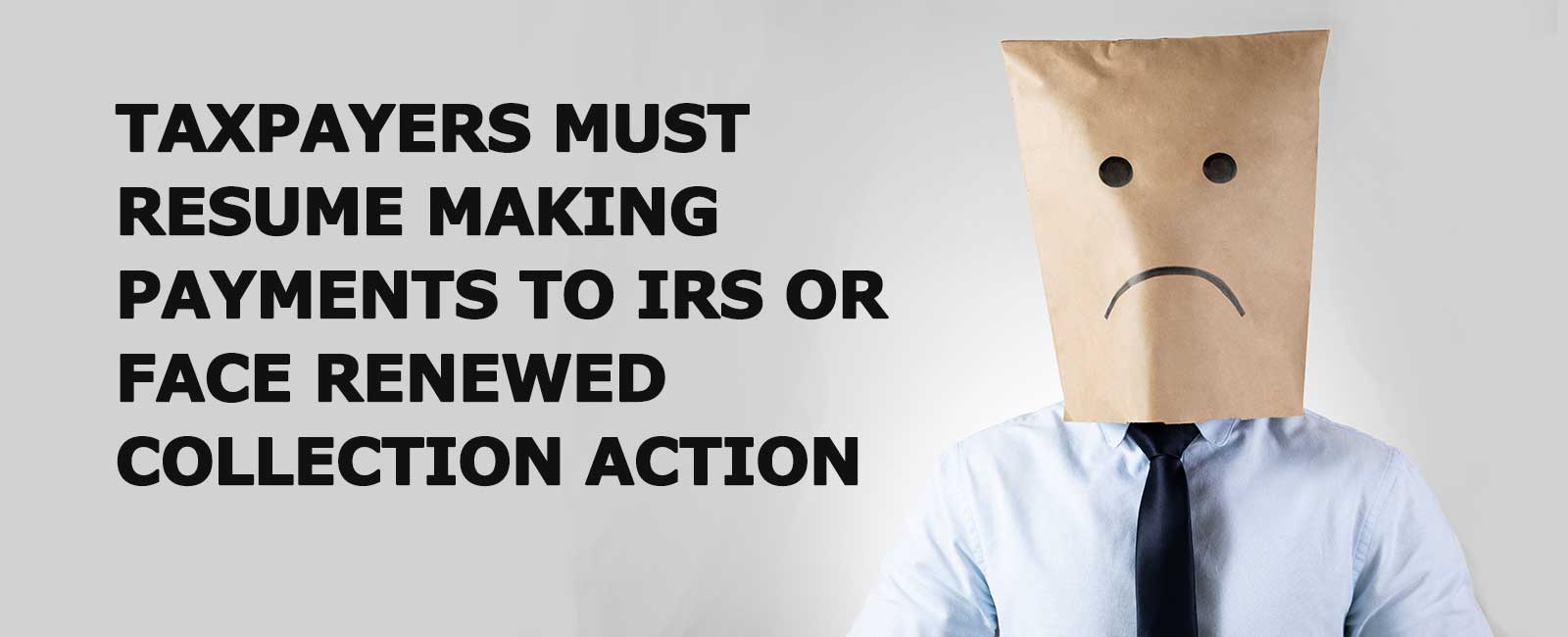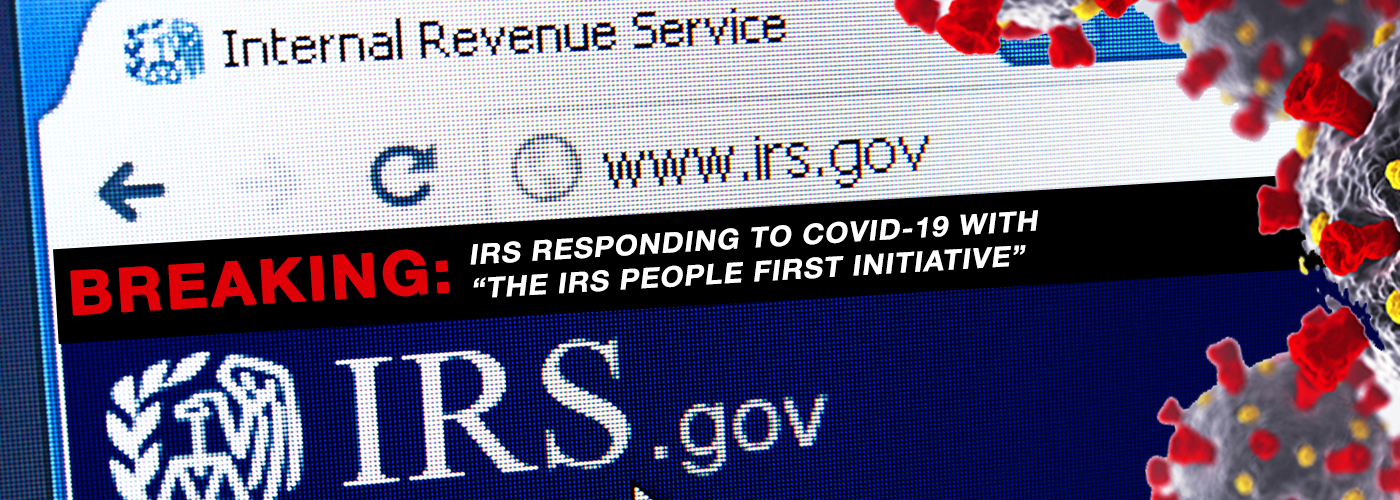After July 15, 2020, Taxpayers Must Resume Making Payments To IRS Or Face Renewed Collection Action
After July 15, 2020, Taxpayers Must Resume Making Payments To IRS Or Face Renewed Collection Action
On March 25, 2020 the IRS issued a press release announcing a sweeping series of steps to assist taxpayers by providing relief on a variety of issues ranging from easing payment guidelines to postponing compliance actions in what it calls “The IRS People First Initiative”.
These new changes include issues ranging from postponing certain payments related to Installment Agreements and Offers in Compromise to collection and limiting certain enforcement actions. The IRS temporarily modified its activities from April 1, 2020 through July 15, 2020. During this period, to the maximum extent possible, the IRS avoided in-person contacts.
Taxpayers who took advantage of The IRS People First Initiative tax relief and did not make previously owed tax payments between March 25, 2020 to July 15, 2020 need to restart their payments or face renew collection action by the IRS.
As the IRS continues to reopen its operations across the country, taxpayers who were in payment agreements and skipped any payments from March 25, 2020 to July 15, 2020 should start paying again to avoid penalties and possible default on their agreements.
Here’s what taxpayers should do to resume their payment agreements to the IRS, including Installment Agreements, Offers in Compromise, and Private Debt Collection program payments:
Taxpayers who suspended their installment agreement payments between April 1, 2020 and July 15, 2020, will need to resume their payments by their first monthly payment due date after July 15, 2020. Taxpayers should be aware that the IRS didn’t default their agreement, but interest did accrue, and the balance remained.
Taxpayers who had their bank suspend direct debit payments should contact the bank immediately to ensure their first monthly payment due date occurring on or after July 15, 2020 is sent to avoid penalties.
If a taxpayer can’t meet their current installment agreement terms due to a COVID related hardship, it is possible to have your agreement modified. An experienced tax professional can see if relief is available for you.
Pending Offers: If the IRS is currently reviewing a taxpayer’s submitted offer but hasn’t accepted it yet, the taxpayer should resume their required payments starting July 15, 2020. The IRS will amend the taxpayer’s offer to allow them to pay any skipped payments at the end of the offer period, if the offer is accepted.
Already Accepted Offers: If a taxpayer has an Offer in Compromise agreement, and the taxpayer was unable to make the payments on their accepted offer because of a COVID-19 hardship, the taxpayer should resume payments and make up the missed payments by July 15, 2020. If the taxpayer is unable to make up the missed payments, an experienced tax professional can see if relief is available for you.
Private Debt Collection
The IRS did not forward new delinquent accounts to Private Collection Agencies (PCAs) from April 1, 2020 through July 15, 2020, and PCA interaction with taxpayers was limited to inbound telephone calls unless requested by a taxpayer in a voicemail or correspondence.
Taxpayers who had their PCA payments on hold should resume payments by July 15, 2020. If a taxpayer can’t meet their current payment agreement terms due to a COVID related hardship, it is possible to have your agreement modified. An experienced tax professional can see if relief is available for you.
Taxpayers Who Owe But Can’t Pay
Taxpayers who are experiencing a hardship or who have questions about their payments may still be able to get additional relief. An experienced tax professional can see if relief is available for you.
An Opportunity For Taxpayers Who Owe The IRS
Do not think that if you owe the IRS your tax problem will disappear because of the measures being considered by the government. Instead you should be utilizing this valuable time to get yourself prepared so that when activity in this nation regains momentum, you are ready to make the best offer or proposal to take control of your outstanding tax debts.
As a prerequisite to any proposal to the IRS, you must be in current compliance. That means if you have any outstanding income tax returns, they must be completed and submitted to IRS.
Also, if you are required to make estimated tax payments, you must be current in making those payments. Fortunately, as we are now in 2020, taxpayers who expect to owe for 2019 should have their 2019 income tax returns done now so that the 2019 liability can be rolled over into any proposal and the requirement to make estimated tax payments will now start for 2020.
Remember that COVID-19 does not alter the tax laws, so all taxpayers should continue to meet their tax obligations as normal. Individuals and businesses should keep filing their tax returns and making payments and deposits with the IRS, as they are required to do.
Also, the IRS will continue to take steps where necessary to protect all applicable statutes of limitations. In instances where statute expirations might be jeopardized during this period and a taxpayer is not agreeing to extend such, the IRS will issue Notices of Deficiency and pursue other similar actions to protect the interests of the government in preserving such statute.
The take away from this – use the Federal government’s downtime and continued uncertainty with COVID-19 to your advantage to prepare for the future.
What Should You Do?
You know that at the Law Offices Of Jeffrey B. Kahn, P.C. we are always thinking of ways that our clients can save on taxes. If you are selected for an audit, stand up to the IRS by getting representation. Tax problems are usually a serious matter and must be handled appropriately so it’s important to that you’ve hired the best lawyer for your particular situation. The tax attorneys at the Law Offices Of Jeffrey B. Kahn, P.C. located in Orange County (Irvine), Los Angeles (including Long Beach and Ontario) and elsewhere in California are highly skilled in handling tax matters and can effectively represent at all levels with the IRS and State Tax Agencies including criminal tax investigations and attempted prosecutions, undisclosed foreign bank accounts and other foreign assets, and unreported foreign income. Also if you are involved in cannabis, check out what a cannabis tax attorney can do for you. And if you are involved in crypto currency, check out what a bitcoin tax attorney can do for you.











 Follow
Follow Follow
Follow